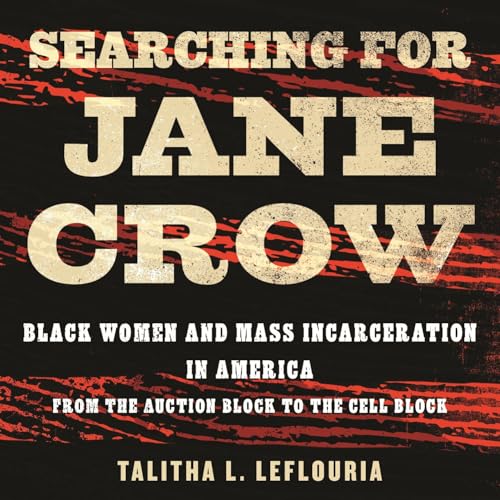
Searching for Jane Crow
Black Women and Mass Incarceration in America from the Auction Block to the Cell Block
No se pudo agregar al carrito
Solo puedes tener X títulos en el carrito para realizar el pago.
Add to Cart failed.
Por favor prueba de nuevo más tarde
Error al Agregar a Lista de Deseos.
Por favor prueba de nuevo más tarde
Error al eliminar de la lista de deseos.
Por favor prueba de nuevo más tarde
Error al añadir a tu biblioteca
Por favor intenta de nuevo
Error al seguir el podcast
Intenta nuevamente
Error al dejar de seguir el podcast
Intenta nuevamente
$0.00 por los primeros 30 días
POR TIEMPO LIMITADO
Obtén 3 meses por US$0.99 al mes
La oferta termina el 16 de diciembre de 2025 11:59pm PT.
 Exclusivo para miembros Prime: ¿Nuevo en Audible? Obtén 2 audiolibros gratis con tu prueba.
Exclusivo para miembros Prime: ¿Nuevo en Audible? Obtén 2 audiolibros gratis con tu prueba.
Solo $0.99 al mes durante los primeros 3 meses de Audible Premium Plus.
1 bestseller o nuevo lanzamiento al mes, tuyo para siempre.
Escucha todo lo que quieras de entre miles de audiolibros, podcasts y Originals incluidos.
Se renueva automáticamente por US$14.95 al mes después de 3 meses. Cancela en cualquier momento.
Elige 1 audiolibro al mes de nuestra inigualable colección.
Escucha todo lo que quieras de entre miles de audiolibros, Originals y podcasts incluidos.
Accede a ofertas y descuentos exclusivos.
Premium Plus se renueva automáticamente por $14.95 al mes después de 30 días. Cancela en cualquier momento.
Haz tu pedido de preventa ahora por $27.30
-
Narrado por:
Historian Talitha L. LeFlouria centers Black women at the core of a fresh argument: that the system of mass incarceration was established as protection for the institution of slavery and the profits of enslavers and that this legacy continues today.
For centuries, Black women in America have experienced extreme rates of arrest, conviction, and incarceration in the nation’s jails and prisons, yet their experiences have often been overlooked in favor of Black men’s.
Arguing that the merger between profit and punishment continues to keep Black people bound, LeFlouria traces the connection between enslavement and incarceration, revealing how they have always been intertwined--from the domestic slave trade of 1810-1865, when more than one million people were incarcerated in privately owned slave jails, to the post-Civil War era when Black people were enslaved through new systems of state-sponsored mass incarceration, and through to today.
Using archival sources and personal testimonies, LeFlouria tells a new origin story of mass incarceration with the stories of numerous Black women throughout history, including:
• Delia Garlic, who was incarcerated in a slave jail and later sold to a sheriff at the height of the domestic slave trade
• Eliza Purdy, who was jailed and sold to the highest bidder a year after the Civil War ended, and
• Susan Burton, who was commodified and trafficked through a 20th-century cell block, much like an enslaved person on the auction block 200 years prior.
Todavía no hay opiniones



